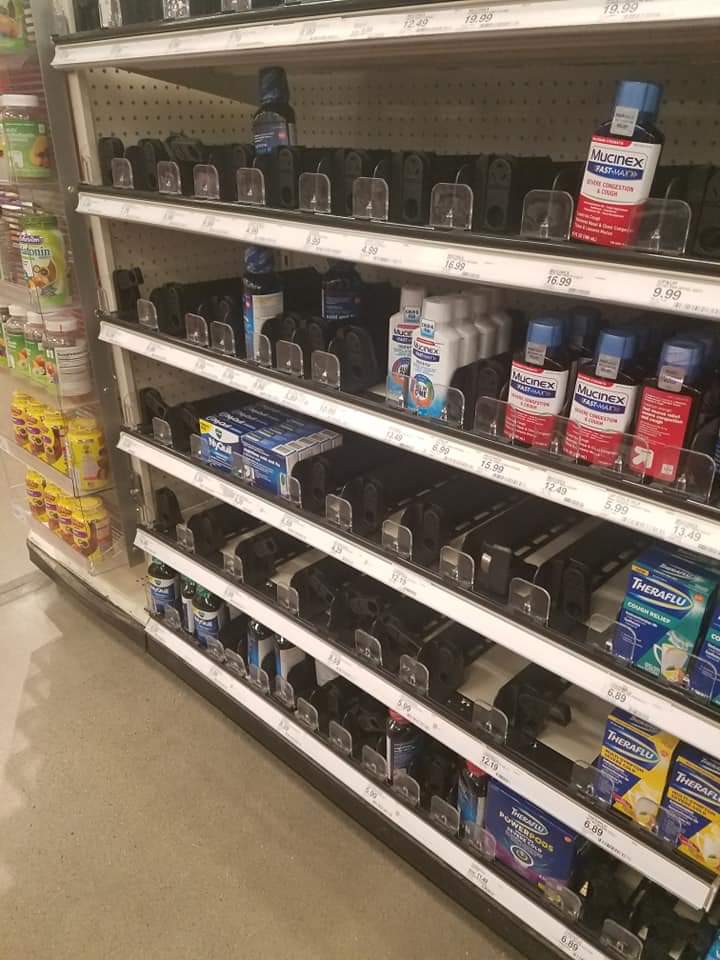My brother sent me a text today with a photograph from a pharmacy in Minneapolis. He said that several stores resemble the empty shelves seen in this image all over the city. I had to laugh because I am pretty sure that Mucinex will not protect us from the COVID-19, also known as the coronavirus.

The coronavirus is on everyone’s mind. And why shouldn’t it be?
It’s on TV, in the papers, on social media, and is the topic of almost every conversation. Of course it’s scary. We hear about all the bad facts (and rumors) and it’s difficult to process — especially as parents. We have a duty to not only take care of ourselves but our families as well.
Last week I had the wonderful opportunity to share my daily life with all of you on Iowa City Mom’s Instagram stories. My family and I are currently residing overseas in Madrid, Spain. If you were able to catch my posts that day, February 26, you would know that was the day that we found out that the coronavirus was confirmed in our city, and more specifically in our neighborhood.
I was fearful about the confirmation but what hit me the hardest were the rumors and fear that was being spread through the lower school, which frightened my oldest daughter, who is eight years old.
Due to living so close to Italy it was only a matter of time until the coronavirus would arrive in Spain. When we first heard of the news it wasn’t to anyone’s surprise . . . it was actually expected. As a community we were preparing for it. When we heard the first case was in Pozuelo, a residential neighborhood where my family lives, works, and attends school, it was difficult to process.
That first day was sheer panic.
I’m a middle school teacher at an international school in Pozuelo so many of the students were scared and on top of that my daughter was hearing all sorts of rumors about the virus from her peers. A faculty meeting was scheduled at the end of the day to discuss the school’s protocols and to learn more about the virus. Our headmaster and school nurse practitioner were already on top of their game and were working closely with the U.S. Embassy and the Spanish Ministry of Health.
During their conversations with the experts they were able to obtain and forward all factual information with us, including where to look for up to date information and a list of sources to avoid.
Because of this, we were able to learn factual evidence that calmed our nerves.
I am not a medical professional nor an expert with infectious diseases. I don’t want to tell any of you what you should or should not be doing. However I’d like to share with you the facts that have been shared with me, which can also be found on the Centers for Disease Control and Prevention (CDC) and World Health Organization (WHO) websites.
It is up to you about whether or not you want to continue learning more about the virus, and whether or not to share this information with your families.
The following was updated on the CDC website on March 3, 2020.
Current risk assessment:
Low Risk
For the general American public, who are unlikely to be exposed to the virus at this time, the immediate health risk from COVID-19 is considered low.
Elevated
People in communities where the virus that causes COVID-19 has been reported and are experiencing ongoing community spread are at an elevated –though still relatively low risk– of exposure.
Healthcare workers caring for patients with COVID-19 are at an elevated risk of exposure.
Close contacts of persons with COVID-19 also are at an elevated risk of exposure.
Travelers returning from affected international locations where community spread is occurring also are at an elevated risk of exposure.
Food for Thought About the Coronavirus from an American Expat
Pandemic
When we hear the word Pandemic it is often linked to fear due to the hype that the media creates. In the news we see headlines that state, “Brace Yourself for a Pandemic.” The word “brace” gives a false representation of the word pandemic — and those without the knowledge of the word see this as a threat.
Pandemic doesn’t necessarily mean that it’s a bad illness per say. If you look up the definition of pandemic, it simply states that a pandemic is an illness that is prevalent throughout an entire country, continent, or the whole world. It’s an epidemic over a large area. The spread of an illness in multiple countries.
Past flu related illnesses have also been considered pandemics.
My close friend’s husband had the swine flu, a pandemic from 2009-2010, and he’s now thriving. He said it felt like the flu and nothing more. Obviously individuals can contract a pandemic virus and make a full recovery.
Discrimination
The coronavirus does not discriminate and anyone can contract the illness. It just happened to occur first in China. Do not point fingers at one another and remember to treat everyone with kindness and compassion.
Fatalities
The death toll is highest among those who are elderly and have a compromised immune system — due to the coronavirus being a respiratory virus. Also of note: 80 percent of cases have shown to be very mild, and not all patients who test positive are hospitalized. The CDC has provided home care information for those who have tested positive and can be quarantined from home.
Closures
Proper protocol (the closing of schools, daycares, large events, etc.) has been put in place not because the illness is deadly, but simply to stop the spread of it.
Other ways to stop spreading illness is to follow typical flu protocols. The CDC has provided information on non-pharmaceutical treatments to help prevent the spread of the virus.
Face Masks
Follow CDC’s recommendations for using a face mask. Healthy individuals should refrain from wearing a mask. The CDC does not recommend that people who are well wear a face mask to protect themselves from respiratory diseases, including COVID-19. Face Masks should be used by people who show symptoms of COVID-19 to help prevent the spread of the disease to others. The use of face masks is also crucial for health workers and people who are taking care of someone in close settings, like at home or in a care facility.
Pregnancy
According to the CDC, there is not any scientific evidence that proves that the COVID-19 is deadly for pregnant women.
Stocking Up
Stocking up on non-perishable food items isn’t necessary, however I understand that this might make some feel more at ease. I’m living in a city (and neighborhood) where the virus has been detected and no one is stock piling food. The grocery store shelves are still full.
If you need to stock up on items, the CDC has suggested focusing on a 30-day supply of personal medications or prescriptions, not over the counter medications. It also suggests common food staples such as milk, rice, and eggs. Or household goods like laundry detergent, and toilet paper, and baby items like formula, and diapers.
Fake News
You can also stop the spread of false news and rumors. If someone tells you something that they’ve heard ask where they received their information. Ask them to site their resources and to share them with you. If they cannot, then move on. Check out these five tips from National Public Radio (NPR) on how to spot misinformation.
You can always go straight to the source — visit the CDC and WHO websites for updated, factual information.
Talking to Your Kids
For relaying information to your children, BrainPop has created a fantastic video that explains what the coronavirus is and what to expect.











No, Mucinex will not prevent coronavirus or any virus, but it thins mucus, so when you cough, you are able to move the secretions out of your lungs more easily. The trouble with this virus is that it causes the body to produce thick secretions that are very hard to cough up. So, all joking aside, Mucinex IS useful if you are coughing. I’m a pharmacist.
Hi Stacy,
Thank you for your comment. I’m curious if you read my article? I was simply commenting about how people in the States were hoarding items that were not suggested by the CDC. I NEVER joked about the virus in my article.
I appreciate your advice considering that you are a pharmacist. Living in Madrid, the epicenter of COVID-19 cases in Spain, I am aware of the capabilities of this virus. In fact, I have been living in this hell for 3 weeks and wrote this article as a warning to families in the States about the severity of the virus.
I, in no way was joking about COVID-19 and I’m sorry that the title made you think and feel as such.